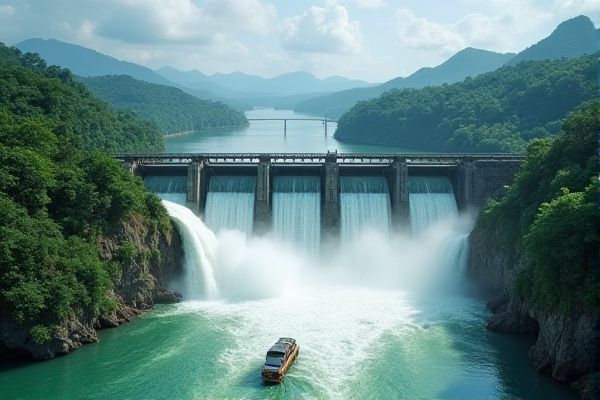
Thailand's hydropower sector is expanding, resulting in a variety of job opportunities for professionals in engineering, environmental science, and project management. The government is investing in renewable energy projects, with a focus on sustainable development and reducing carbon emissions. Positions often require expertise in hydrology, turbine technology, and power generation systems to ensure efficient operation and maintenance of facilities. Additionally, roles related to community engagement and environmental impact assessments are crucial, as these projects aim to balance energy needs with ecological preservation.
Job Description
Hydropower jobs in Thailand encompass various roles focused on the design, development, and maintenance of dams and renewable energy systems. Positions include hydrologists, engineers, and project managers, all critical in ensuring the efficiency and sustainability of hydropower projects. Professionals in this field often collaborate with government agencies and private companies to promote green energy initiatives and enhance energy security. With Thailand's increasing investment in renewable sources, your career in hydropower could contribute significantly to the country's energy landscape and environmental goals.
Requirement
Hydropower jobs in Thailand typically require a background in engineering, environmental science, or related fields, emphasizing skills in project management and technical expertise. Many positions demand familiarity with local regulations, hydrological studies, and renewable energy technologies specific to the region's ecosystem. Proficiency in both Thai and English is often beneficial, as it facilitates communication with local stakeholders and international teams. Relevant experience in previous energy projects can significantly enhance your candidacy in this growing industry, which is vital for Thailand's sustainable energy goals.
Salary and Perks Expected
Hydropower jobs in Thailand offer competitive salaries, often ranging from 20,000 to 80,000 THB per month, depending on experience and job position. Various roles include engineers, project managers, and technicians, all integral to the growing renewable energy sector. Employees may also enjoy perks such as health insurance, retirement benefits, and opportunities for career advancement in this rapidly expanding field. Your potential for professional growth is significant, as Thailand continues to invest heavily in sustainable energy infrastructure.
Similar Job Names
- Hydropower Project Manager
- Hydraulic Engineer
- Civil Engineer (Hydropower)
- Electrical Engineer (Hydropower)
- Environmental Scientist
- Geotechnical Engineer
- Operations Manager
- Maintenance Technician
- Control Systems Engineer
- Hydrologist
- Quality Assurance Specialist
- Safety Officer
- Project Engineer
- Financial Analyst (Energy Sector)
- Research and Development Engineer
Job Expectation Concept
Hydropower jobs in Thailand are essential for contributing to the country's renewable energy goals and sustainable development. Professionals in this sector engage in various roles such as project management, engineering, and environmental assessment, ensuring efficient energy production while minimizing ecological impact. Growing investment in hydropower projects provides ample employment opportunities, as the government aims to increase energy self-sufficiency. Engaging in hydropower careers allows you to play a significant role in advancing Thailand's energy landscape while offering a pathway for personal and professional growth.
Career Advantage and Weakness
Hydropower jobs in Thailand offer a significant advantage due to the country's abundant water resources and commitment to renewable energy initiatives. Your opportunities for career growth are enhanced by government support and investment in sustainable energy projects, leading to increased demand for skilled professionals in the sector. However, job security can be a concern, as hydropower projects are often subject to environmental regulations and seasonal water availability. The potential for natural disasters, such as floods or droughts, may also create volatility in job stability within the hydropower industry.
Important Thing Must Know
Hydropower jobs in Thailand play a significant role in the country's renewable energy sector, contributing to sustainable development and energy security. The Thai government is actively investing in hydropower projects, creating numerous opportunities for engineers, technicians, and project managers. You can find positions in both private companies and state-owned enterprises as Thailand continues to expand its hydropower capacity. Familiarity with local regulations and environmental standards is essential for success in this field. Networking within the industry can enhance your chances of finding a rewarding career while supporting Thailand's green energy initiatives.
Alternative Career Options
Hydropower jobs in Thailand offer various alternative career opportunities beyond traditional engineering roles. Positions in project management, environmental consultancy, and regulatory compliance are increasingly valued, given Thailand's focus on sustainable energy. You can explore roles in research and development, particularly in innovative technologies that enhance efficiency and reduce environmental impact. Additionally, the growing emphasis on community relations creates openings in social responsibility and stakeholder engagement within hydropower projects.
Companies List
- Electricity Generating Authority of Thailand (EGAT)
- Thailand Hydroelectric Power Plant
- Ratchaburi Electricity Generating Holding Public Company Limited
- Gulf Energy Development Public Company Limited
- Chao Phraya Energy Company
- Chiang Mai Hydroelectricity Company
- Thai Oil Public Company Limited
- Power Plant Construction and Maintenance Company
- PTT Public Company Limited
- Hydro Power Development Company
List of Ideal City
Thailand offers several cities that are ideal for pursuing hydropower jobs, especially with its rich water resources and commitment to renewable energy. Chiang Mai is known for its environmental initiatives and proximity to various hydroelectric projects, making it a hub for related employment opportunities. Krabi, with its scenic waterways, is also emerging as a location for hydropower development, attracting professionals in the sector. In addition, the capital city, Bangkok, serves as a central point for many energy companies, providing diverse job openings in hydropower.
 jobs-thailand.com
jobs-thailand.com